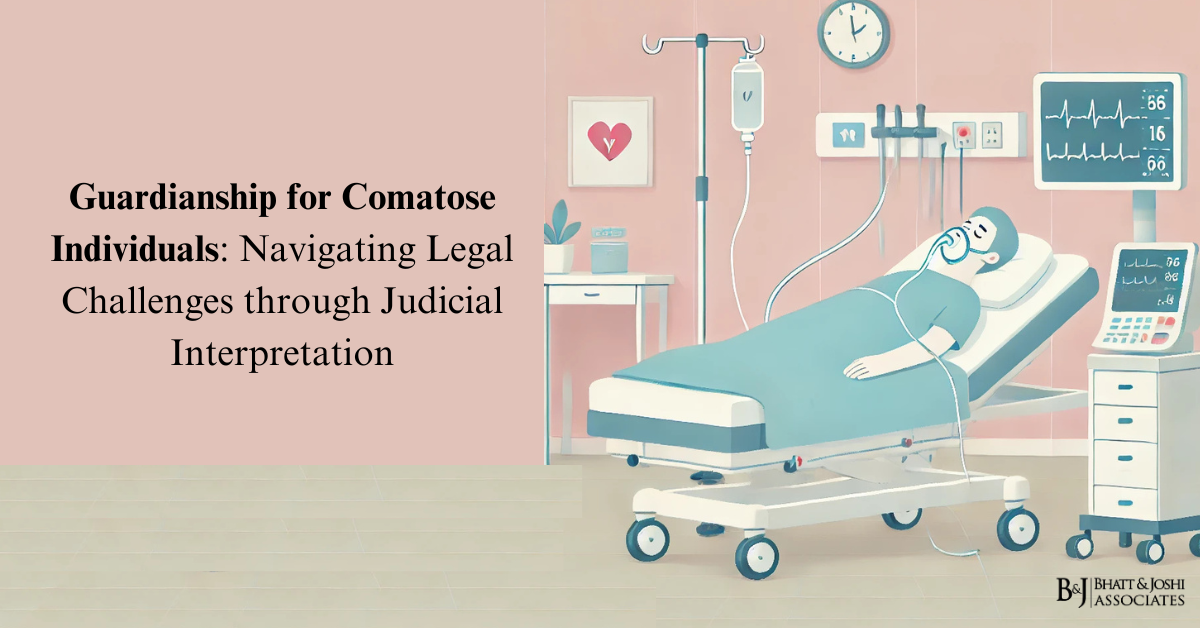Guardianship for Comatose Individuals: Navigating Legal Challenges through Judicial Interpretation
Introduction
The plight of individuals in comatose or vegetative states brings to light critical gaps in India’s legal framework. While legislative enactments address guardianship for minors, mentally incapacitated individuals, and persons with disabilities, there is no statute governing the appointment of guardians for individuals in a comatose state. In landmark cases like Dipaben W/O Dhaval Laxmikant Bhatt v. State of Gujaratand Anjuben Karansinh Dodiya v. State of Gujarat, Indian courts invoked their extraordinary jurisdiction under Article 226 of the Constitution, relying on the parens patriae doctrine to address this legislative void. This article explores the judicial reasoning and legal principles underpinning these decisions, emphasizing the urgent need for legislative reforms.
The Legislative Vacuum and Judicial Response
Statutory Frameworks and Their Shortcomings
Existing statutes like the Guardian and Wards Act, 1890, the Mental Healthcare Act, 2017, and the National Trust Act, 1999 cater to specific categories of individuals requiring guardianship but fail to address the needs of comatose persons. As highlighted in Dipaben W/O Dhaval Laxmikant Bhatt, the Gujarat High Court acknowledged this deficiency, stating:
“There is no legislative enactment providing for appointment of a guardian for persons in a comatose state. Courts are often compelled to invoke their extraordinary jurisdiction under Article 226 to fill this legislative gap.”
Similarly, in Anjuben Karansinh Dodiya, the court underscored that the absence of legislation places families of comatose individuals in dire straits, unable to manage the patient’s financial and medical needs effectively.
Judicial Innovation through Parens Patriae
The doctrine of parens patriae, rooted in British common law, enables courts to act as guardians for those unable to care for themselves. Indian courts have applied this doctrine in various contexts, including child custody and the welfare of mentally incapacitated individuals.
In Dipaben W/O Dhaval Laxmikant Bhatt, the court cited the Kerala High Court’s ruling in Shobha Gopalakrishnan v. State of Kerala, which held:
“In cases where no statutory remedy exists for persons in a comatose state, the courts must step in under Article 226 as parens patriae to safeguard their rights and interests.”
The Gujarat High Court reiterated this principle in Anjuben Karansinh Dodiya, stating:
“The court, as the ultimate guardian under Article 226, is duty-bound to protect the rights of individuals in a vegetative state and provide relief by appointing a guardian.”
Case Summaries and Key Judicial Observations
Dipaben W/O Dhaval Laxmikant Bhatt v. State of Gujarat (2021)
In this case, the petitioner sought to be appointed as the guardian of her husband, who had been in a vegetative state since 2014 due to hypoxic brain injury. The court, relying on medical reports and affidavits from legal heirs, granted her caseguardianship, allowing her to manage the patient’s movable and immovable properties.
Key observation:
“Considering the absence of legislative provisions, the court deems it appropriate to invoke its jurisdiction under Article 226, ensuring that the petitioner can manage the financial and medical needs of her husband, who is incapable of making decisions.”
Anjuben Karansinh Dodiya v. State of Gujarat (2024)
Here, the petitioner’s husband had been in a comatose state since 2019 due to a brain hemorrhage. The family faced significant financial burdens, spending approximately ₹2 lakhs per month on medical expenses. The court allowed the petitioner to manage her husband’s properties and financial accounts, emphasizing the urgent need to address the legislative vacuum.
Key observation:
“When statutory remedies are absent, courts must act within the framework of Article 226 to ensure that the rights of the affected individuals and their families are upheld.”
Guidelines for Guardianship in Comatose Individuals Cases
Both judgments provided clear guidelines for appointing guardians under the parens patriae doctrine:
- Verification of Legal Heirs: Affidavits from all legal heirs, affirming their consent to the proposed guardian’s appointment, must be submitted.
Example: In Anjuben Karansinh Dodiya, the petitioner’s children and father-in-law filed affidavits, confirming their no-objection to her appointment.
- Medical Board Assessment: A medical board, including a neurologist, must evaluate the patient’s condition and confirm their inability to make decisions.
Example: In Dipaben W/O Dhaval Laxmikant Bhatt, the medical team concluded: “The patient is not competent to make or execute any decision.”
- Disclosure of Assets: Petitioners must provide a detailed inventory of the patient’s assets, including movable and immovable properties.
- Periodic Reporting: Guardians are required to submit periodic reports on their management of the patient’s assets and welfare to ensure transparency and accountability.
The Need for Legal Reforms in Guardianship for Comatose Individuals
Absence of Comprehensive Legislation
While statutes like the Mental Healthcare Act, 2017 and the Rights of Persons with Disabilities Act, 2016 address guardianship for individuals with mental or physical disabilities, they exclude comatose individuals. Courts have consistently highlighted this omission, urging Parliament to enact specific legislation.
Recommendations
- Codification of Judicial Guidelines: Guidelines established in cases like Shobha Gopalakrishnan, Dipaben Bhatt, and Anjuben Dodiya should be codified into law to provide clarity and consistency.
- Creation of a Comprehensive Statute: A standalone law addressing guardianship for comatose individuals should include:
- Procedural safeguards for appointing guardians.
- Clear roles and responsibilities for guardians.
- Mechanisms for periodic judicial oversight.
Conclusion
The cases of Dipaben W/O Dhaval Laxmikant Bhatt and Anjuben Karansinh Dodiya underscore the critical role of judicial intervention in safeguarding the rights of comatose individuals. By invoking the parens patriae doctrine, courts have provided much-needed relief to affected families. However, the reliance on judicial discretion highlights the urgent need for legislative action. A comprehensive legal framework is essential to ensure uniformity, accountability, and justice for individuals in a comatose state and their families.
 Whatsapp
Whatsapp


